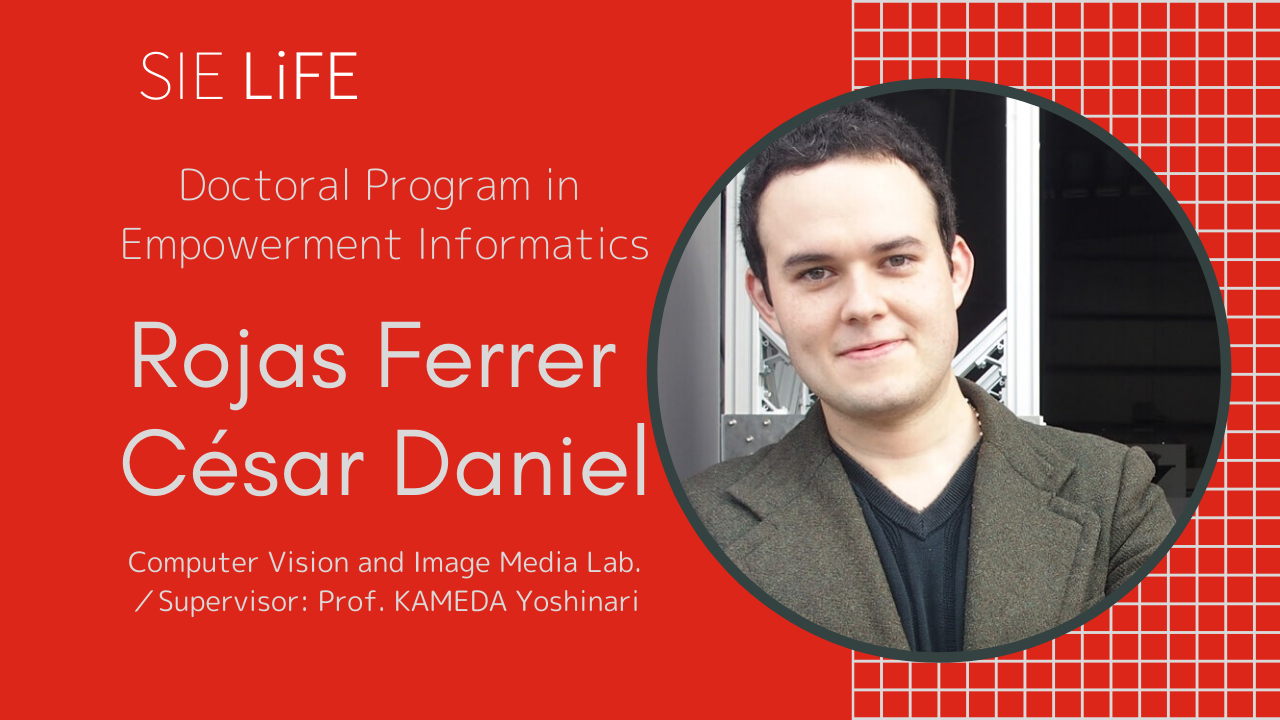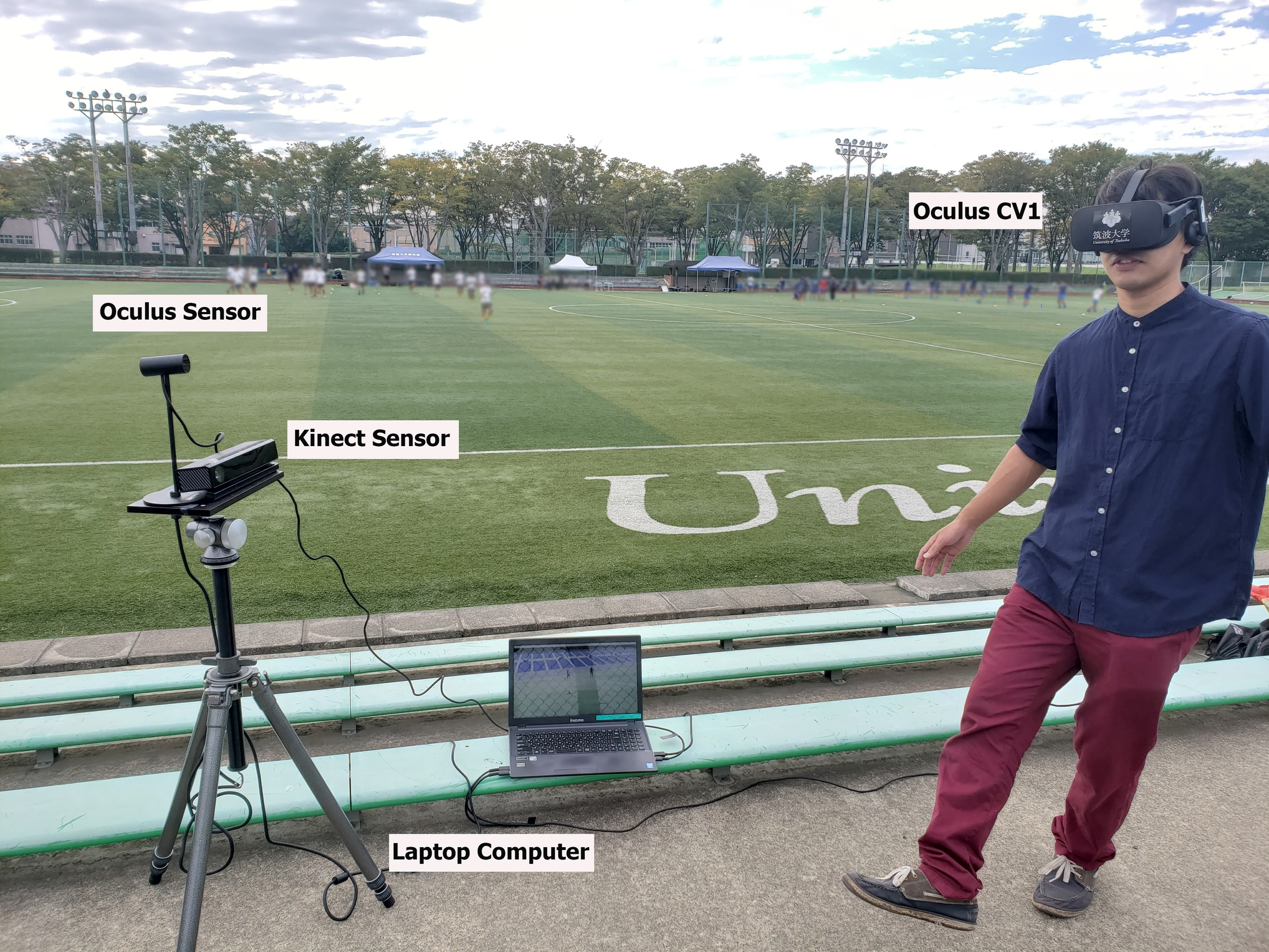Empowerment Informatics
Focus (Introduction of SIE)

Students’ interview vol.1: Mr. Rojas Ferrer César Daniel (Doctoral Program in Empowerment Informatics)
The Degree Programs in Systems and Information Engineering are eager to explore students’ stories here in Tsukuba through the interview.
Today, Mr. Rojas Ferrer César Daniel, a doctoral candidate from the Doctoral Programs in Empowerment Informatics (EMP), talks about his research on a Virtual Reality soccer simulation and experiences in the program.
First of all, what brings you to the Doctoral Program in Empowerment Informatics?
My answer may come across a little bit too straight forward, but since I was a little toddler with a dubious degree of self-consciousness, I found fascinating the “magic” behind technology. I was just a curious kid searching for exciting stimuli that could make those around me and myself surprised. That curiosity eventually led me to the Doctoral Program in Empowerment Informatics. To be honest, if you asked me ten years ago, even in my wildest dreams I would’ve never imagined myself in my current situation, about to graduate from a premier Japanese institution majoring in a field that I felt was more like something straight out from a science fiction movie than a school.
How did you find out about the Computer Vision and Image Media Lab?
Back in my home country, Venezuela, I applied to the MEXT Scholarship for international students. During the application process, we were required to proactively search for prospective advisors to conduct our future research in Japan. I contacted prominent researchers all over Japan by searching their email address in their respective homepages to find the best match. Ohta Sensei (Professor Emeritus and founder of my lab), Kameda Sensei (my supervisor) together with Kitahara Sensei and Shishido Sensei (current lab faculty members) just clicked with me in so many levels, they made me feel welcome genuinely while allowing me to try various research ideas. Many international students may feel intimidated at first, but later find that Japanese professors at major institutions are rather open to contact foreign students; so please, don’t feel intimidated and be bold with full curiosity. In a nutshell, knock the door without second thoughts.
Could you explain briefly about your research topic for those who may not be very familiar with it?
That is a difficult question, but I will try to answer. I am doing my best to decipher the underlying visual mechanisms behind soccer player’s decision-making behavior by analyzing their visual exploratory activity within a Virtual Reality (VR) simulation. In a nutshell, what and when do they look at something/somewhere before making an in-game decision (i.e., passing, shooting, dribbling, etc.), leading to optimal game outcomes.
For that purpose, I use state-of-the-art VR technology to recreate fully controlled soccer in game situations, while recording the player gaze-behavioral data for further analysis by coach experts in a way that’s nearly impossible in real time with currently available technology.

What sparked your initial interest in the VR soccer simulation?
Since I was about five years old, I used to play soccer, that is my favorite sport by far from a young age.
Also, I am a fan of cyberpunk genre films/anime (i.e., Akira, Serial Experiments Lain, Ghost in the Shell, Ergo Proxy, and my all-time favorite Neon Genesis Evangelion). So, on one side of the fence I had football soccer, and on the other I got over the top/bigger than life tech dystopias. To me it was a no brainer, let’s try to fusion both worlds!
The University of Tsukuba was the only place that offered me the required freedom to do that.
When I was an apprentice playing soccer at my high school, our coach used to yell at us, “raise your head and look around more before acting!” but we didn’t understand what he meant precisely. That made me think: What if we measure players’ head and eye exploratory behavior to determine a concrete skill-based evaluation criterion quantitively that everyone could understand inside a VR simulation?
That is how I came up with my current research topic, Read-the-game: System for skill-based visual exploratory activity assessment with a full-body virtual reality soccer simulation.
Let’s talk about the EMP curriculum.
Could you introduce your favorite courses you have taken so far?
EMP curriculum is demanding. I don’t want to sugar coat it, it has many unique courses that incite student’s curiosity and participation, more intensively compared to other programs. We are “motivated” to compete while being friends and rivals at the same time. That is not the general standard in other Japanese programs in my opinion. It may seem harsh at first, but thanks to that type of cordial rivalry we created long-lasting friendships founded on the hardships we had to overcome together. Definitely, I would retake EMP courses any day if you ask me. If I had to pick one class out of our curriculum, I would definitely go with Project Based Research (PBR). Unlike other courses, in that class we are required to create a fully functional exhibitable system while collaborating with other students from our program, more than often from different labs and areas of expertise. That class served as a fertile proving ground for invaluable multidisciplinary collaboration and long-lasting friendship-making.
Please tell us about your life here in Tsukuba. You must be busy with research and other responsibilities but what do you like to do in your spare time?
The University of Tsukuba has a HUGE Campus. The second biggest in Japan (unified campus) if I am correct. That gave me the chance to freely try out my newly found bicycle skills. To provide some background context, back in my country I never used urban bicycles, so after coming to Japan, a major bicycle country, was a refreshing change of air and an opportunity to test some of my newly learned skills. At first, I felt a bit intimidated, but after a couple of weeks, I found myself eager to go cross country all over the prefecture. I still cycle around campus every now and then.
Moving to a new country may feel uncomfortable at first for sure, but it showed me a new side of myself I never imagined existed. Since then, I became an advocate of traveling and wandering around without destination (some of my best memories). Let that Google Maps rest a bit and let yourself wander around aimlessly for a change!
What are your aspirations/goals for the future after getting a degree?
I already found a job placement fitting my aspirations. After graduating, I will become a researcher in my field of interest in a major Japanese Company. In my relative ignorance, I feel an engineer can’t be a true expert unless he gets extensive experience in industry, just like an MD can’t be a full-fledged medical doctor unless he deals with critically ill patients. That is what made me pursue my current path. Being part of the EMP program gave me definite advantages towards that goal. EMP creates unique opportunities for students to experience active internships in top R&D institutions. Thanks to that fact, I was able to find the best match for my career purposes early in the job-hunting process.
In the long run, once I am old I want to look back and see the world is a better place due to my actions, no matter the scale.
Finally, could you give any message/words to those who are considering to study in our degree programs?
Most students will surely find a myriad of interesting fields in our faculty even if they are not fully science-oriented.
Now between you and me, for most Ph.D. students based on my personal experience, if you are curious oddballs and strive for intellectual freedom while aiming for rigorous supervision and self-developing opportunities, Tsukuba is a no brainer. At first, I had my reserves to be honest (many good schools in Japan), but nowadays; If I had a second chance to choose an institution for my professional formation in this or any country, I would choose Tsukuba again without falter.
Related Links
- Doctoral Program in Empowerment Informatics (Five-Year Comprehensive Doctoral Program):https://www.emp.tsukuba.ac.jp/english
- Computer Vision and Image Media Lab.:http://www.image.iit.tsukuba.ac.jp/



